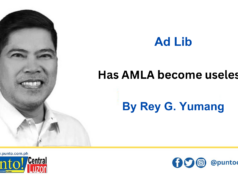MALOLOS CITY—The Commission on Human Rights (CHR) has vowed to lead a campaign for zero disenfranchisement in the 2010 elections.
Lawyer Cecilia Quisumbing of the CHR said all Filipinos of voting age must be able to cast their votes next year.
“We will campaign for the zero disenfranchisement for next year’s elections,” said Quisumbing in her keynote address at the opening of the 13th National Press Forum of the Philippine Press Institute (PPI) at the Diamond Hotel in Manila last week.
She said that among the groups that usually have hard time casting their votes during elections are the members of the indigenous people, and those with language impairment and other persons with disabilities.
Quisumbing said that those people have the political right to cast their votes, but usually failed to do so because precincts are not accessible.
“There must be someone who will assist them for them to do their basic duties as citizens,” she said.
She also asked journalists to cite situations of people with disabilities as part of reporting human rights situations.
Quisumbing also noted the situation of thousands of inmates detained in different jails across the country.
She also cited what she described as a “glaring human rights situation” of the inmates who are not living with a P30 per month budget for their health care.
“Marami na sa kanila ang may high blood pressure, magkano na ba ngayon ang pa-check up at gamot sa high blood. Clearly, hindi kasya yung P30 per month,” she said.
She said that at least 90 percent of detainees are not yet convicted but are languishing in jails.
“They cannot exercise their right to vote because there is no system or facility for them,” she said.
Lawyer Cecilia Quisumbing of the CHR said all Filipinos of voting age must be able to cast their votes next year.
“We will campaign for the zero disenfranchisement for next year’s elections,” said Quisumbing in her keynote address at the opening of the 13th National Press Forum of the Philippine Press Institute (PPI) at the Diamond Hotel in Manila last week.
She said that among the groups that usually have hard time casting their votes during elections are the members of the indigenous people, and those with language impairment and other persons with disabilities.
Quisumbing said that those people have the political right to cast their votes, but usually failed to do so because precincts are not accessible.
“There must be someone who will assist them for them to do their basic duties as citizens,” she said.
She also asked journalists to cite situations of people with disabilities as part of reporting human rights situations.
Quisumbing also noted the situation of thousands of inmates detained in different jails across the country.
She also cited what she described as a “glaring human rights situation” of the inmates who are not living with a P30 per month budget for their health care.
“Marami na sa kanila ang may high blood pressure, magkano na ba ngayon ang pa-check up at gamot sa high blood. Clearly, hindi kasya yung P30 per month,” she said.
She said that at least 90 percent of detainees are not yet convicted but are languishing in jails.
“They cannot exercise their right to vote because there is no system or facility for them,” she said.




